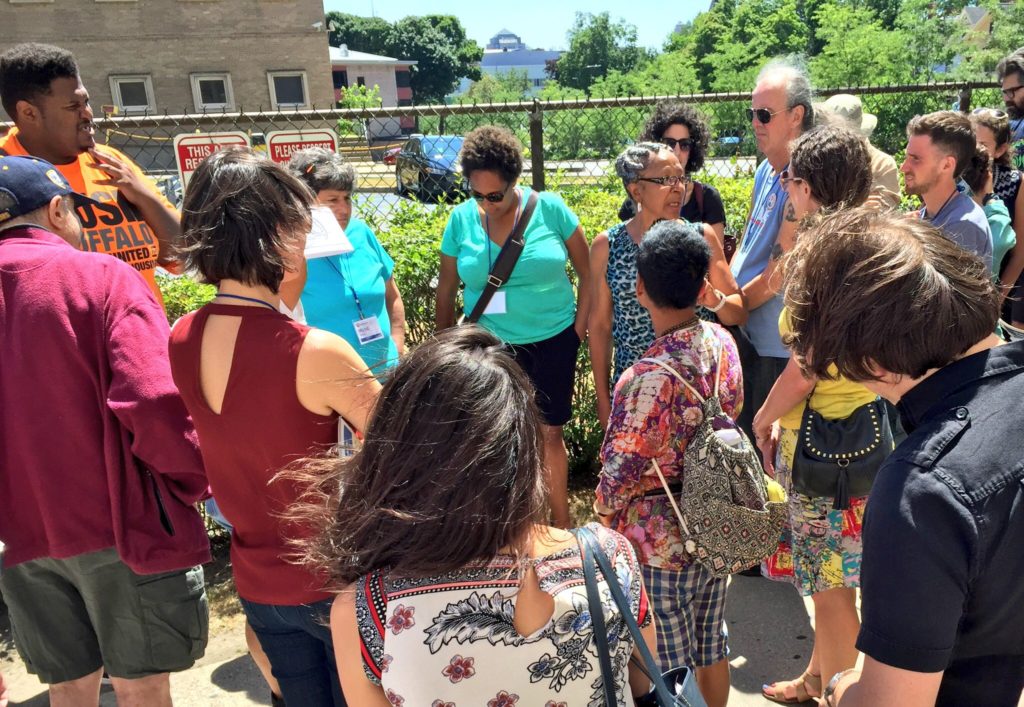
This is the second post from Jenn Miller, Atkinson’s Director of Social Investment, on movements, money and possibilities. The Atkinson Decent Work Fund is now open for submissions with a deadline of September 1, 2016 for Letters of Inquiry. For more information, please visit our grants page.
Last month I travelled to Buffalo for a conference that brought together community organizers, advocates and academics to talk about strategies for a people and planet-centre economy.
Buffalo, only two hours south of my home in Toronto, is making an ambitious comeback after a long economic decline.
Musings from the Fruit Belt
I spent a hot, sunny afternoon in the Fruit Belt neighbourhood – ground zero for current economic development in the region with the expansion of the Buffalo Niagara Medical Campus.
The Fruit Belt takes its name from the orchards its first residents, German immigrants, planted in the area. Today the neighbourhood is largely African-American, close knit and highly engaged. Residents are worried about the proposed development. They fear it will isolate and displace long-time inhabitants. From John, a young community organizer with PUSH Buffalo, and Miss Lott, a six-generation Fruit Belt resident, I learned about the area’s rich history of community engagement and activism. Community members spoke about recent efforts – resulting in both wins and losses — to arrive at an agreement that would ensure local residents see real economic benefit from the planned expansion of the medical campus, essentially a community benefit agreement. They spoke passionately about development that would benefit everyone, as opposed to the all too prevalent belief in development at any cost.
I left Buffalo inspired by communities creating strategies that will make a difference, such as negotiating community benefits, scaling worker owned cooperatives and leveraging the spending power of public sector institutions (e.g government agencies, hospitals and universities/colleges) to purchase from businesses owned by equity seeking communities (e.g. Aboriginal Peoples, racialized people, people with disabilities, newcomers, women and LGBTQ2S people) and businesses owned and operated by a charity or not for profit organization.
These can be powerful tools that create equitable and inclusive economic growth.
Closer to home
On the drive home, I thought about how racism, poverty and displacement play itself out in my hometown. Toronto is the income inequality capital of Canada, with an ever-increasing gap between rich and poor households. Those living in poverty are largely female, racialized and recent immigrants. Further, over half of workers in Toronto are in precarious employment.
I also reflected on the incredible resilience, creativity and organizing that I see in places across the province like Rexdale, Durham and Sudbury, and in sectors like health care and early childhood education. Communities where people are working alongside their neighbours and colleagues for better, more secure jobs and paths to prosperity.
Make decent work a reality
Through our grant program, the Atkinson Decent Work Fund, we’re investing in people who are organizing their communities to protect workers’ rights, create decent work, and share the benefits of public investment and economic growth more equitably. Like Buffalo’s John and Miss Lott, these movement builders are proposing ways to make the economy work better for everyone in the province.
We are eager to hear about and learn from the stories and experiences of your neighbourhoods, cities and sectors. Who are your organizers and allies? How are you working with others to make decent work a reality in Ontario?
Photo above: PUSH Buffalo’s John Washington (far left) and Fruit Belt resident Miss Lott (centre) share their vision of neighbourhood investment. Photo credit: Harper Bishop, Open Buffalo
